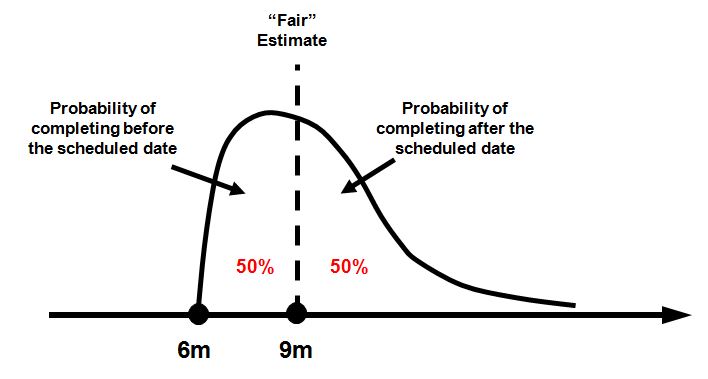Through my years of hands-on project management work, consulting and training engagements I frequently noticed that project managers – or as I jokingly refer to them, “homo projectus” – at times have a very different perspective on things than “normal” people. So, below I took the liberty of documenting some of the situations where project manager’s psyche appears to be quite different from that of the human beings surrounding him.
- Estimate is a range, not a single number – While many of us regard the notion of estimate fairly casually, freely using phrases like, “I think I will be done with this task in three hours”, or “I have budgeted $10,000 for the kitchen renovation project”, real project managers never provide single-number estimates due to inherent risks and uncertainties of any project. Instead they always provide their estimates in ranges.
For example, a good project manager will say something to the effect of, “We think we can finish our home renovation in between two to three weeks”.
- Estimates, Targets, Commitments – while these three words are frequently used as synonyms by the “normal” people, project managers know that there are distinct differences between these three terms. When they estimate, they usually answer questions like, “How much will it cost us to do Task A?”
When they target, they attempt to provide the answers to questions like, “Can we build these features by 15-Nov-2015?” And finally commitment sounds like, “We are 90% sure that we can deliver this project in four months”
- Estimates vs. Probabilities – unlike regular people good project managers know that these two concepts are strongly correlated. For example, when a resource says, “On average this task should take me five days to accomplish”, the project manager is usually the only person in the room who knows that the probability of finishing this task on-time is only 50% (see Figure 1).
- Accuracy, Precision, Reliability – While these words are used interchangeably by the “normal” people, a good project manager would always clarify, “Do you want an accurate, precise or a reliable estimate?”
In the project management vocabulary “accurate estimate” implies “a range that includes the actual outcome” (e.g. estimate range - 5-11 weeks; actual duration - 7 weeks). On the other hand, “precision of an estimate” is simply the exactness of the numbers provided: e.g. total project effort = 1,275.49 man-hours.
And the reliable estimate reflects the level of confidence the project manager and his team have in the numbers provided: e.g. “I’m 90% sure we can do it in 12 months”.
- Questions – Project managers love to ask a lot of seemingly irrelevant and annoying questions like “Why are we doing this project?”, “Why do you want this feature?”, “What happens if we don’t implement this requirement?”and “If you don’t know the answer to this question, then who does?” just to name a few. The questions they ask could be direct, open-ended, clarifying and leading.
- Unspecified Information – While the phrase “we receive sales reports” sounds perfectly acceptable to a normal person, a number of red flags goes up in the head of the homo projectus. These include:
- Who is “we”? (specific persons, entire department or representatives of other departments?)
- What is meant by “receive”? (mailed, faxed, e-mailed, delivered through a specific software program?)
- What is a “sales report”? (what fields are included, what kind of information should be there, is it just one report or several different types?)
- Unspecified Comparisons – Just like in the previous example statements like “the new airport terminal should be better” make project managers very uneasy. Right away her brain produces an array of questions like:
- Better compared to what? (to the existing terminals at your airport or your competitors? best in the world?
- Better in what way? (in terms of square footage, overall passenger capacity, logistics, usage of computer technologies, security?)
- Who decided that it should be better?
- What is the reasoning behind this decision to increase capacity, improve logistics or security?
- Imposing Measurability – Project managers always strive to make things as measurable as possible. They like to convert phrases like “the website shall be user-friendly” into “the user shall be able to find the desired model of a laptop in less than 30 seconds”.
- Bad Words – Project managers – unlike normal people - are extremely allergic words like “improved”, “better”, “faster”, “superior” “seamless”, “transparent”, “graceful”, etc. The universal question that usually follows after hearing these words from the customer is, “What exactly did you mean when you said that the car should be fast?”
- Conscious and Unconscious Requirements – A good project manager is always aware of the unconscious requirements that exist in the head of almost any customer. While the conscious requirements are uppermost in the stakeholders’ minds and often are symptomatic of something that the stakeholders want to improve, the unconscious requirements frequently go unmentioned because the customers know so much about them and assume everyone else knows them as well.
About the Author
Jamal Moustafaev, MBA, PMP – president and founder of Thinktank Consulting is an internationally acclaimed expert and speaker in the areas of project/portfolio management, scope definition, process improvement and corporate training. Jamal Moustafaev has done work for private-sector companies and government organizations in Canada, US, Asia, Europe and Middle East. Read Jamal’s Blog @ www.thinktankconsulting.ca
- Please follow me on Twitter:
- Like our page on Facebook:
- Connect with me on LinkedIn:
- Subscribe to my RSS feed:
Jamal is an author of two very popular books: Delivering Exceptional Project Results: A Practical Guide to Project Selection, Scoping, Estimation and Management and Project Scope Management: A Practical Guide to Requirements for Engineering, Product, Construction, IT and Enterprise Projects.

